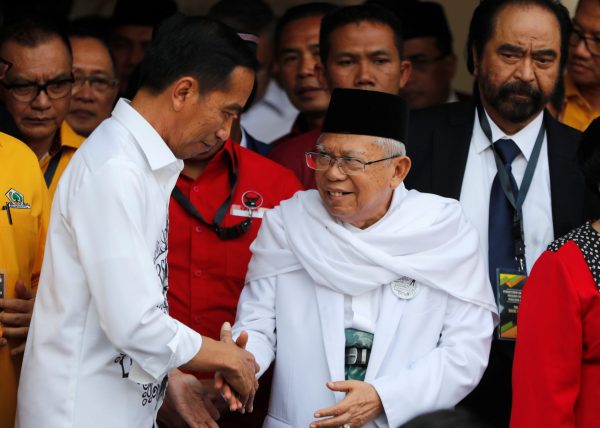These rallies, dubbed ‘Defending the Tauhid Action’ were organised by the National Movement to Safeguard Fatwas (GNPF). They were triggered by an incident in October 2018, where members of the youth wing of the Nahdlatul Ulama (NU), Indonesia’s largest Islamic organisation and a supporter of Jokowi, burnt a flag bearing the Islamic declaration of faith. During the rallies to protest the flag’s burning, there were calls of ‘ganti presiden’ (change the president) as some protesters attempted to connect the rallies to the election campaign.
Both presidential candidates take the prospect of identity politics featuring in the campaign very seriously. Jokowi has appointed the conservative and senior Islamic scholar Ma’ruf Amin as his vice-presidential candidate. And in mid-September 2018 Prabowo signed a pact with conservative Islamic scholars and Muslim activists at a congregation of the GNPF, the organiser of the recent rallies.
With Amin on the ticket, Jokowi has a strong tool to mobilise identity politics should he choose to do so. Until recently, Amin was both the rais ‘aam (supreme leader) of the NU, a champion of moderate Islam, and chairman of the more conservative-leaning Indonesian Ulema Council (MUI).
Amin was behind the 2005 fatwa against Indonesia’s Ahmadiyah Muslim minority group and was key expert witness in a trial that sent Jakarta’s former Chinese-Christian governor Basuki ‘Ahok’ Tjahaja Purnama — then Jokowi’s closest ally — to jail for blasphemy in 2017. The blasphemy fatwa became the raison d’être for the GNPF and consolidated a massive Islamist mobilisation against Ahok. This mobilisation — supported by Prabowo’s camp, which championed Ahok’s opponent Anies Baswedan in the April 2017 Jakarta gubernatorial election — marked the culmination of identity politics in Indonesia’s post-reform era.
It is clear that the President hopes that Amin’s nomination will shield him from the likelihood of Prabowo’s camp launching a sectarian campaign against him and prevent conservative voters from overwhelmingly siding with Prabowo.
Rather than actively mobilising religious sentiments, Amin’s first moves as vice-presidential candidate have been geared at limiting the other camp’s opportunities for a sectarian campaign. Despite being urged to resign from both the NU and the MUI, Amin only resigned from the NU and did not give up his MUI chairmanship. This is likely because the NU (save for those in the organisation’s conservative ‘NU true path’ or garis lurus faction) is already relatively solid in its support for Jokowi. The MUI is more nuanced in its political stance, with some leaders initially being involved in the GNPF and connected to parties that support Prabowo. Amin’s decision to retain his MUI chairmanship could be aimed at curbing the Council from leaning towards Prabowo’s side.
Amin is also pushing for the Islamic concept of wasatiyyah (middle way), which in Indonesia refers to the practice of moderate Islam. NU’s doctrine of Islam Nusantara — the application of Islam within Indonesia’s socio-cultural context — upholds similar moderate values. But Islam Nusantara’s branding as a predominantly NU doctrine might make it unattractive to non-NU members. The wasatiyyah is deemed more accommodative to Indonesian Muslims from various traditions.
Amin will focus his campaign in regions where Jokowi lost in 2014. These include the religiously homogenous Aceh, West Sumatra and West Java, which are known to be Prabowo’s strongholds. In West Java’s 2018 gubernatorial election, the less popular candidate backed by the Prosperous Justice Party (PKS) and Great Indonesia Movement Party (Gerindra) almost won due to religiously charged campaigning. North Sumatra’s 2018 gubernatorial election was also dominated by identity politics and won by candidates supported by PKS and Gerindra. Jokowi’s camp hopes that Amin will be able to attract religious voters in these provinces.
The recent rallies show that despite Amin’s nomination, Jokowi is still susceptible to ‘attacks’ by Islamic groups that have pledged allegiance to his opponent, such as the GNPF. The friction between the opposing groups, when aggravated, could potentially lead to a bitter sectarian campaign next year.
Another important question is whether partnering with a progressive president will alter Amin’s ideological standpoint beyond the campaign season. Despite Amin’s efforts to accentuate moderatism — for instance by visiting churches while campaigning in North Sumatra — there are concerns that Amin’s negative stance on Muslim minorities like the Ahmadiyah and Shia remain unchanged.
Recent cases such as the blasphemy charges against a woman who complained about the volume of the loudspeakers at a mosque and the forced closure of churches by hard-line groups continue to challenge the country’s commitment to religious tolerance. Whether Amin will really try to do something about Indonesia’s long-standing issue of religious discrimination is something to keep an eye on as the campaign heats up.
Deasy Simandjuntak is an Associate Fellow in the Regional Strategic and Political Studies Program at the ISEAS-Yusof Ishak Institute.

